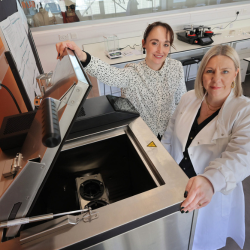-
Study
-
Undergraduate
- Search for a Course
- Undergraduate Open Day & Events
- Application Guides
- Northumbria University UCAS Exhibitions
- Foundation Years
- Undergraduate Fees & Funding
- School & College Outreach
- Continuing Professional Development
-
Postgraduate
- Postgraduate Study Degree
- Postgraduate Research Degrees
- Postgraduate Open Days and Events
- Postgraduate Fees & Funding
- Flexible Learning
- Thinking about a Masters?
- Continuing Professional Development
- Change Direction
-
Student Life
- The Hub - Student Blog
- Accommodation
- Life in Newcastle
- Support for Students
- Careers
- Information for Parents
- Students' Union
- Northumbria Sport
- Be Part of It
-
-
International
International
Northumbria’s global footprint touches every continent across the world, through our global partnerships across 17 institutions in 10 countries, to our 277,000 strong alumni community and 150 recruitment partners – we prepare our students for the challenges of tomorrow. Discover more about how to join Northumbria’s global family or our partnerships.
View our Global Footprint-
Applying to Northumbria
- European Union
- Our London Campus
- Northumbria Pathway
- International Events
- Entry Requirement and Education Country Agents
- Global Offices
-
Northumbria Language Centre
- Faculty Requirements
- Acceptable English Requirements
- Pre-sessional English Language and Study Skills
- Academic Language Skills Programmes (ALS)
-
International Fees, Funding & Scholarships
- International Undergraduate Fees
- International Undergraduate Funding
- International Masters Fees
- International Masters Funding
- International Postgraduate Research Fees
- International Postgraduate Research Funding
- International Money Matters
-
Life at Northumbria
- International student support
- Careers
-
International Mobility
- Current Northumbria Students
- Incoming Exchange Students
-
-
Business
Business
The world is changing faster than ever before. The future is there to be won by organisations who find ways to turn today's possibilities into tomorrows competitive edge. In a connected world, collaboration can be the key to success.
More on our Business Services -
Research
Research
Northumbria is a research-rich, business-focused, professional university with a global reputation for academic quality. We conduct ground-breaking research that is responsive to the science & technology, health & well being, economic and social and arts & cultural needs for the communities
Discover more about our Research -
About Us
-
About Northumbria
- Our Strategy
- Our Staff
- Place and Partnerships
- Student Profiles
- Alumni Profiles
- Leadership & Governance
- Academic Departments
- University Services
- History of Northumbria
- Contact us
- Online Shop
-
-
Alumni
Alumni
Northumbria University is renowned for the calibre of its business-ready graduates. Our alumni network has over 246,000 graduates based in 178 countries worldwide in a range of sectors, our alumni are making a real impact on the world.
Our Alumni - Work For Us
What will I learn on this module?
This module is designed for business students to develop a non-technical understanding of the key aspects of corporate financial theory and practice. The module covers the core aspects of raising capital and determining financing, though to investing capital in major corporate decisions, and finally returning value to shareholders.
Specifically you will study in the module; Sustainable Value Management, Stock Market Efficiency, Capital Asset Pricing Model, Portfolio Theory, International Cost of Capital, Capital Structure Decisions, Dividend Policy, Corporate Valuation and International Merger & Acquisition activity.
The module has a focus on business responsibility of all of those areas, concentrating on professional codes of conduct in areas such as the banking industry, accounting and similar finance areas, and the types of dilemmas that graduates could face in professional practice. This module will develop you as a critical and reflective practitioner, equipping you with the skills to think independently, analyse data, and help you to identify your own areas of interest in relation to corporate finance and practice. In the module you will become more aware of the issues that responsible businesses face when attempting to implement financial concepts and theories into practice.
On completion of this module you will have produced a reflective learning journal (in the form of a Blog or similar platform) based on your evaluation of theory to real world scenarios. As part of that journal you will have watched and reflected on appropriate financial documentaries and movies which explore responsible financial management issues, where you are encouraged to share these with your peers on the module Virtual Learning Environment (VLE). Finally you will be apply your academic knowledge to a real world case and be able to critically evaluate the tensions between the financial academic theories as a responsible business attempts to maximise shareholder wealth.
How will I learn on this module?
Each module session follows a similar structure of Learn, Explore Further and Apply. All learning materials and resources are accessible via our virtual learning environment.
In this module you are responsible for your own learning. The self-directed aspects of this module are supported by guidance at the module level through a detailed Teaching and Learning Plan, provided via the VLE. The module is broken down into themes and has recorded video sessions to watch in which financial concepts, theories and practice are introduced, which are reinforced through Blackboard Collaborate sessions. Before and after each area of content, you have directed reading on a teaching and learning plan, and you will be able to access this reading directly through an online reading list on the modules Blackboard site and through the Library website. In the teaching and learning plan you will also find weekly directed multimedia support where you are directed to access through the Blackboard site a range of appropriate financial documentaries and financial movies.
This module uses has two main core textbooks, which are eBooks available to freely access through the library. On a weekly basis you will be referred by the teaching and learning plan and content recordings to various chapters in the core textbooks. These core textbook’s have numerous end of chapter self-assessment exercises for you to practice upon. You will have weekly activities to consider the recorded materials supported by the VLE. These will reinforce the concepts introduced in the preceding week’s recorded sessions with real world news stories drawn from the Financial Times, Bloomberg, business cases and other relevant examples of professional practice and appropriate research papers. You are encouraged to post your reflections on to the discussion boards and to use your library provided FT.com subscription and the associated FT.com phone app to explore similar relevant business stories occurring in the press at that time.
As part of the modules continuous learning strategy you will be reflecting upon the theory you’ve been exposed to on a weekly basis and comparing and contrasting this to contemporary events, and then writing these reflections into a learning journal (which is in the form of a blog or similar platform). You will at the end of this period of writing your learning journal write a Statement of Learning, which is your reflection on your complete learning journey as you have progressed through the module.
How will I be supported academically on this module?
A range of approaches are adopted to accelerate your learning in this module.
During the first week of this module, you will receive information about the module and Teaching & Learning Plan. The teaching and learning plan (TLP) sets out
• Learning outcomes and overall module and programme aims
• Teaching, learning and assessment strategy
• Teaching schedule
• Directed reading references (text and journals) and core texts for the module
During this module your module tutor will provide academic support including:
• Delivering on—line materials
• Providing guidance in relation to assignments
• Development of key resources, made available through the VLE
• Assessing assignments and assess or review any other agreed summative or formative outputs as appropriate
You will be supported by a team of academic experts and will have the opportunity to receive feedback on on-going work giving you the opportunity to respond directly.
Where appropriate, students may also be directed to engage with Study Skills +, or other resources offered through the University Student Support Services such as Dyslexia Support.
The Library is open 24 hours a day and E-Learning Portal houses all your module documents including your timetable. These services can be accessed on a range of devices
The module will also have an e-reading list which directs learners to specific reading for each session. This includes direct access to repositories, journal articles and other academic sources. You will also be provided with access to a significant set academic research sources via the Northumbria University library portal.
You will also have opportunities to receive formative feedback from your tutor in response to opinions you express and issues you raise during workshop sessions and face-to-face or online tutorials. These formative feedback sessions are formally scheduled at key points throughout the module.
What will I be expected to read on this module?
All modules at Northumbria include a range of reading materials that students are expected to engage with. Online reading lists (provided after enrolment) give you access to your reading material for your modules. The Library works in partnership with your module tutors to ensure you have access to the material that you need.
What will I be expected to achieve?
Knowledge & Understanding:
MLO1: You will be able to come to reasoned, critical judgements regarding the impact of financing and dividend decisions on shareholder wealth with an ability to contrast theory from practice.
MLO2: You will be able to propose justifiable, sustainable and responsible solutions, based on your critical evaluation of empirical academic evidence, to complex real world financial problems.
Intellectual / Professional skills & abilities:
MLO3: You will be able to display developed reflection and critical analysis skills through exploring financial practice and real-world financial decisions.
Personal Values Attributes (Global / Cultural awareness, Ethics, Curiosity) (PVA):
MLO4: You will be able to critique the codes of conduct that finance professionals are governed by and be able to evaluate dilemmas that responsible businesses face when making financial decisions with complex consequences.
How will I be assessed?
The assessment will be by a 3,000-word, 100% assignment, in the form of a portfolio of assignment tasks. This range of tasks fully covers all the module learning outcomes. [MLO1, MLO2, MLO3, MLO4]
Formative assessment will include both tutor and peer feedback on your reflective posts as you progress though the module. [MLO2, MLO3, MLO4].
Pre-requisite(s)
None
Co-requisite(s)
None
Module abstract
Responsible financial management is at the heart of business decision making. How much should we spend? How much should raise the money? What sustainable value are we creating? These are all crucial international corporate finance questions. This module takes a holistic and reflective approach to your learning, with you developing a portfolio of your consideration of financial topics. You will engage with financial news stories in the Financial Times or Bloomberg and apply your learning on the module to them, as well as your reflections on financial documentaries, movies and leading applied research in the area which are available on the module’s VLE. This module will develop you to have an awareness of contemporary financial events and the underpinning academic literature surrounding them, so that when you go for an interview with an employer you are able to display a reflective, evaluative and critical understanding of the financial challenges modern business face.
Course info
Credits 20
Level of Study Undergraduate
Mode of Study 18 months Distance Learning
Department Newcastle Business School
Location City Campus, Northumbria University
City Newcastle
Start Upcoming Intakes - April 2025, July 2025, October 2025.
Business and Management BA (Hons) Top Up
- Business and Management BA (Hons) - Frequently Asked Questions
- Business and Management BA Top Up - Module Orders for Upcoming Intakes
- Four Transferable Skills You’ll Learn on Our Business and Management BA
- “What is a Top Up Degree?”- Your Questions Answered
- What Are My Options After a Foundation Degree?
- Questions You May Have After Your HND, Answered
- “Why I Chose to Study a Top Up Degree After My HND”
All information is accurate at the time of sharing.
Full time Courses are primarily delivered via on-campus face to face learning but could include elements of online learning. Most courses run as planned and as promoted on our website and via our marketing materials, but if there are any substantial changes (as determined by the Competition and Markets Authority) to a course or there is the potential that course may be withdrawn, we will notify all affected applicants as soon as possible with advice and guidance regarding their options. It is also important to be aware that optional modules listed on course pages may be subject to change depending on uptake numbers each year.
Contact time is subject to increase or decrease in line with possible restrictions imposed by the government or the University in the interest of maintaining the health and safety and wellbeing of students, staff, and visitors if this is deemed necessary in future.
Useful Links
Find out about our distinctive approach at
www.northumbria.ac.uk/exp
Admissions Terms and Conditions
northumbria.ac.uk/terms
Fees and Funding
northumbria.ac.uk/fees
Admissions Policy
northumbria.ac.uk/adpolicy
Admissions Complaints Policy
northumbria.ac.uk/complaints














